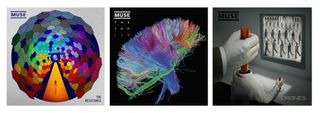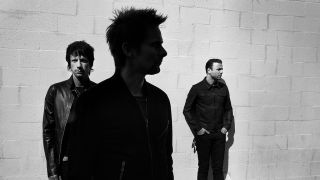Muse don’t do frivolous. Having addressed alienation, apocalypse and the insidious creep of state control, the Teignmouth trio’s seventh album, Drones, finds frontman Matt Bellamy watching the skies, taking the unmanned military aircraft of the title as his jump-off point, and building a dystopian narrative from there. The 12 tracks of Drones might rein in the electronica of 2012’s The 2nd Law in favour of a more rocking sound, but when we meet Bellamy and bassist Chris Wolstenholme at Berlin’s Hotel De Rome it’s clear that the band’s ambition is as sprawling as ever.
Let’s start with the album’s theme.
Matt Bellamy: I’d read a book documenting all the different drone strikes that had taken place in the FATA [Federally Administered Tribal Areas] in West Pakistan and Afghanistan. And I was quite shocked by how prolific they were, how many there had been and how advanced the technology is. Also, I was quite shocked to learn about the term ‘kill decision’ – like, how kill decisions are made and how there’s a sequence of people involved. Often, Obama would come down for breakfast and right afterwards he would make a number of kill decisions. But the point was the degree of distance that was created. Technology creates a huge degree of distance between the end result and the kill decision, and this distance is getting bigger and bigger. The new technology they’re inventing now is to do with autonomous drones; drones that can make their own kill decisions without any humans involved. So it struck me that the modern drone is the ultimate technological example of how human empathy is being taken away from everything.

Meaning the album is like a call to arms?
MB: It’s a call to individuality, freedom of thinking and valuing human empathy over efficiency and technology. There comes a simple point in time where one must accept the flaws and inefficiency of human thinking, because human thinking comes with additional layers, such as empathy and feelings and connections. When we focus purely on efficiency, computer modelling and things like that, we are losing something very important. Really, the album is kind of expressing the desire to really consider that technology might not be taking us in the right direction.
We’ve forgotten how to be human?
_MB: _Yeah. To me, Drones is summed up by the final line where we say: ‘When it comes to kill decisions, absolutely not. There’s no way that a computer should ever be able to make this decision.’
Have you tried one of those little drones that you can buy for 150 dollars?
MB: Oh, the quadcopters or the mini-ones, you mean? I’ve got a big one. And you can actually make good home videos with it. I’ve flown one around [Malibu] but it was kind of research, y’know? I mean, these drones are very, very different to the ones which are used for nefarious purposes [laughs].
Was it a conscious decision to go for a more human sound on this album?
MB: Yeah. I think we’re taking this theme across every point of the album. The production and musical approach is using less technology. We’re trying to stress that human emotion is more important than technical interest or technical experimentation, probably a bit more so than on the last album. So yeah, it’s kind of like a central theme. Every time we had to make a decision on the album – whether it be a lyrical decision or a musical decision or a creative decision or a sound decision – I came back to this central theme about the idea that drones represent humans becoming very cold and very efficient. And that’s something that I don’t really like the idea of.
Chris Wolstenholme: The phrase ‘back to basics’ has come up a few times, although I don’t think we ever said it ourselves. If there was ever any talk of a song being stripped-down, I think we were talking more about the instrumentation, as opposed to the arrangements. The electronic side of things started creeping in around [2001 album] Origin Of Symmetry – songs such as Bliss and Plug In Baby. With each album, the electronic influence got stronger and stronger. And on The 2nd Law we probably got to the point where we took it as far as we could without becoming an electronic band per se. So when we say stripped-down, it was more of a return to being a guitar, bass and drums band, and making that the focal point of the band again.
All the press about this album deals with its stripped-down approach. But there’s stuff like The Globalist, which is a ten-minute-monster, changing from a movie score to a heavy metal piece to a piano ballad…
MB: Exactly. It’s the opposite of stripped-down.
It’s like three songs in one, really. To me, as I say, the narrative of the album is Dead Inside through to Aftermath, and The Globalist is like a separate little short story which kind of charts the rise and the fall of a dictator-type person. I was thinking about calling the song The British Empire, actually, but I thought that might be a little controversial. But it was essentially the idea of the kind of obsession with expansionism.
To what degree are songs like Dead Inside inspired by what you’ve been through on a personal level – such as separating from actress Kate Hudson?
MB: There may be some connection. I mean, when I’m writing Dead Inside I’m thinking a little bit about what it’s like to fall in love with robots, or to have too much love for android or drone-like or computer-like thinking. Like in that film Her [about a writer who falls in love with his computer’s advanced operating system]. Something where the tragedy is where humans can overly value the importance of technology to the point where they completely forget to connect with real people. This can lead to a feeling of being dead inside. But, yeah, I think there are some reflections through the journey, the expressions throughout the album, which connect to many points in my life where I felt out of control, maybe, or felt maybe a little bit cold or a little bit disconnected, you know?

Your last two albums were self-produced. This time you brought in Robert John ‘Mutt’ Lange, who’s a classic rock dude: Foreigner, Def Leppard, AC/DC. Is that what you’re into?
_CW: _Well, definitely AC/DC. The reason we wanted to go with Mutt was, when we did The 2nd Law we fully intended to use a producer, but the producers we were talking about weren’t available when we started recording, so we kind of just started and then finished. And we were like, oh, we’ve done another album on our own.” We always said we wanted to have a producer on this album, I guess so we could focus more on the playing. Because when you produce albums yourself you spend more time in the control room than you do in the live room. Which is good – it’s nice to be creative in that way – but I think sometimes it’s good as a band to just have the instrument in your hand and just focus on the playing side.
But the one thing we wanted with this album was for it to sound consistent from start to finish, particularly with the drums and bass. A similar kind of drum sound runs throughout the album, there’s similar bottom-end stability. That’s one thing that Mutt’s done really well. He’s recorded some great albums that from start to finish just have a sound about them, have a character. When you listened to The 2nd Law, every song sounded completely different. So yeah, we wanted to get away from that, particularly with Drones being an album that had a strong concept, it made sense that sonically it had to be conceptual as well.
Matt, how does it feel being called the Jimi Hendrix of your generation?
MB: I think that’s ridiculous. I’ve never fully understood the references to me being a good guitarist. I think it’s a sign that maybe the guitar hasn’t been very common in the last decade. There’s not many [new] guitarists, really. There’s a few, but you go back to the seventies there were hundreds and hundreds of great guitarists. We live in a time where intelligent people – or clever, creative people – have actually chosen computers to make music. Or they’ve chosen to not even work in music, they’ve chosen to work in tech.
There’s an exhaustion of intelligence which has moved out of the music industry and into other industries. Or moved into using technology in a different way. I don’t think we live in an age where there are many superb instrumentalists any more, because being an instrumentalist is a specific choice to actually reduce your options in the modern world. So many young people today are actually choosing technology instead. To answer your question, I don’t think I’m a particularly good guitarist. I think I’m just one of the only guitarists that’s around [laughs]. So it’s almost by default that people seem to think that I’m a good guitarist.
You’re said to hold the world record for smashing up guitars on stage – was it really a total of 140 in 2004?
MB: Again, this is like a legend which has become exaggerated. I think it was back in 2000 or something. There was one year where we had a very difficult year of touring, where we did every single festival, and everything was breaking everywhere. We did, like, fifty-seven festivals around Europe, Australia and America, and everything was breaking all the time. So we ended up just breaking guitars. And it was around the time when I started realising that I didn’t like any guitars, I wanted to get my own guitars. It was around that time that I got my first Manson guitar. So in one year there was maybe like thirty or forty guitars – very cheap ones, okay? – that went down. But I don’t know where this world record came from. I’m not sure it’s verified [laughs].
**Will there be drones buzzing about at your live shows? **
_MB: _We’re looking into it. We’re going to try. There’s health and safety problems. But we’re going to try our best to get something to fly, to represent the album.
CW: Well, yeah, there’s so many possibilities with the video stuff and flying machines. A lot of it is going to boil down to: what are we allowed to do? There’s all sorts of issues with flying things above people’s heads, depending on where you are in the world [laughs].
**Is it true you require a banana and an electric foot massage before going on stage? **
MB: The banana is true, but not the foot massage. That’s not true [chuckles]. But I’ll happily take one if anybody is offering.

